social justice
Palm Sunday Walk for Justice and Peace
The Refugee Advocacy Network About the Palm Sunday Walk for Justice and Peace – Melbourne, 24 March 2024 Since 2014, the Refugee Advocacy Network, has brought together a wide range of groups to plan the Palm Sunday Walk for Justice for Refugees. During the 1970s and 80s there was a tradition of holding Peace rallies…
The post Palm Sunday Walk for Justice and Peace appeared first on The AIM Network.
ACFID welcomes Australian Government’s reinstatement of funding to UNRWA
Australian Council for International Development (ACFID) Media Release The Australian Council for International Development (ACFID), the peak body for humanitarian and development organisations, welcomes the Australian Government’s announcement to reinstate the funding of the United Nations Relief Works Agency (UNRWA). “This decision is overdue given the urgency of the humanitarian catastrophe in Gaza and UNRWA’s…
The post ACFID welcomes Australian Government’s reinstatement of funding to UNRWA appeared first on The AIM Network.
Finding Justice Over the Airwaves
Saidu Umar thought his future was secure in 2006 when he poured his life savings into a piece of land in Sokoto, a city in northwestern Nigeria, for ₦120,000 ($77). His dreams, however, spiraled into a nightmare when, 16 years later, the children of the late owner laid claim to the land.
The late owner’s children claimed that their father hadn’t sold the land before he passed away, making it rightfully theirs. In the legal debacle that unfolded, they alleged possession of documents proving their ownership and demanded that Umar either leave the land or provide financial compensation.
Shocked and confused, the 53-year-old farmer sought refuge with the police and filed a complaint. His claim was later dismissed because he, as is common in Sokoto, had purchased the land in good faith via a verbal agreement with the owner and could not provide any validating documents.
 Saidu Umar was able to reclaim his land in 2022 thanks to the Kukana radio show. Credit: Abdullah Tijani
Saidu Umar was able to reclaim his land in 2022 thanks to the Kukana radio show. Credit: Abdullah Tijani
“I tried everything, but people would tell me that I didn’t have evidence to prove that I owned the land. I even met with several community leaders asking for help but to no avail,” Umar says. “That was until I pleaded my case on Kukana.”
Kukana, roughly translated to “my woes” in English, is a weekly radio show with over 1.7 million active listeners, as reported by the show’s hosts. Since its inception in 2016, the program, which airs on Vision FM, Sokoto’s first private radio station, has committed to voicing the grievances of those unable to access Nigeria’s justice system. In each episode, hosts of the show present victim complaints and then work towards providing solutions.
Crushed by negative news?
Sign up for the Reasons to be Cheerful newsletter.
[contact-form-7]
With his dream of owning land almost slipping away, Umar met and explained his ordeal to the host of Kukana, Ibrahim Salihu Isa, who, after researching the matter, invited him to appear on the show. During the episode, Isa introduced Umar to Ibrahim Tudundoki, a Sokoto-based human rights activist and lawyer.
Tudunoki took the matter to the Sultan’s Palace, Sokoto’s traditional arbiter. Because the Sultan was traveling, he discussed Umar’s case with a local judge, who invited the divisional police officer to investigate further. At this time, the late owner’s brother, Chika Maidaw, got in touch with Isa and confirmed that his deceased brother had indeed sold the land.
 Ibrahim Salihu Isa, the host of the Kukana radio show that has helped address the grievances of thousands of people. Credit: Abdullah Tijani
Ibrahim Salihu Isa, the host of the Kukana radio show that has helped address the grievances of thousands of people. Credit: Abdullah Tijani
“He listened to me on Kukana and was willing to come and testify,” Umar explains. “That was how I got my land back.”
Tudundoki, a regular guest on Kukana, believes in the show’s cause and regularly communicates with Isa to follow up on cases of vulnerable people in Sokoto free of charge.
“Most of the people who appear on Kukana have nowhere to turn to, and if a program like this is not available, they will end up being victims of injustice,” Tudundoki says.
Sokoto is Nigeria’s poorest state, with nearly 90 percent of its population of over six million, living below the poverty line, and more than three-quarters unable to read or write in English, the country’s official language. According to Isa, Kukana’s popularity as an alternative platform for justice stems from these socioeconomic hurdles that render the legal system an unnavigable labyrinth to the majority.
 Mu’azu Habibu Sabaru, the chairman of the Joint Disabled Association, resorted to the show after the association’s social welfare stipend was cut in 2022. Credit: Abdullah Tijani
Mu’azu Habibu Sabaru, the chairman of the Joint Disabled Association, resorted to the show after the association’s social welfare stipend was cut in 2022. Credit: Abdullah Tijani
Among those who can relate to this are members of Sokoto’s differently-abled community, whose government-issued monthly allowance was withheld for almost a year before they presented their case on Kukana.
Mu’azu Habibu Sabaru, the chairman of the Joint Disabled Association, a coalition of different groups of people with disabilities, explains that the social welfare program was first introduced in 2007 and included a monthly stipend of ₦6,500 ($4.16), which was issued to about 7,000 beneficiaries. However, over the years, the payment disbursement became increasingly irregular until it was halted completely in June 2022.
“It was only after we went on Kukana that the governor visited us,” Sabaru says “He had heard our complaint on the radio show.”
Not long after the meeting, the government resumed the program. Sabaru even revealed that the monthly stipend was upped to ₦10,000 ($6.30).
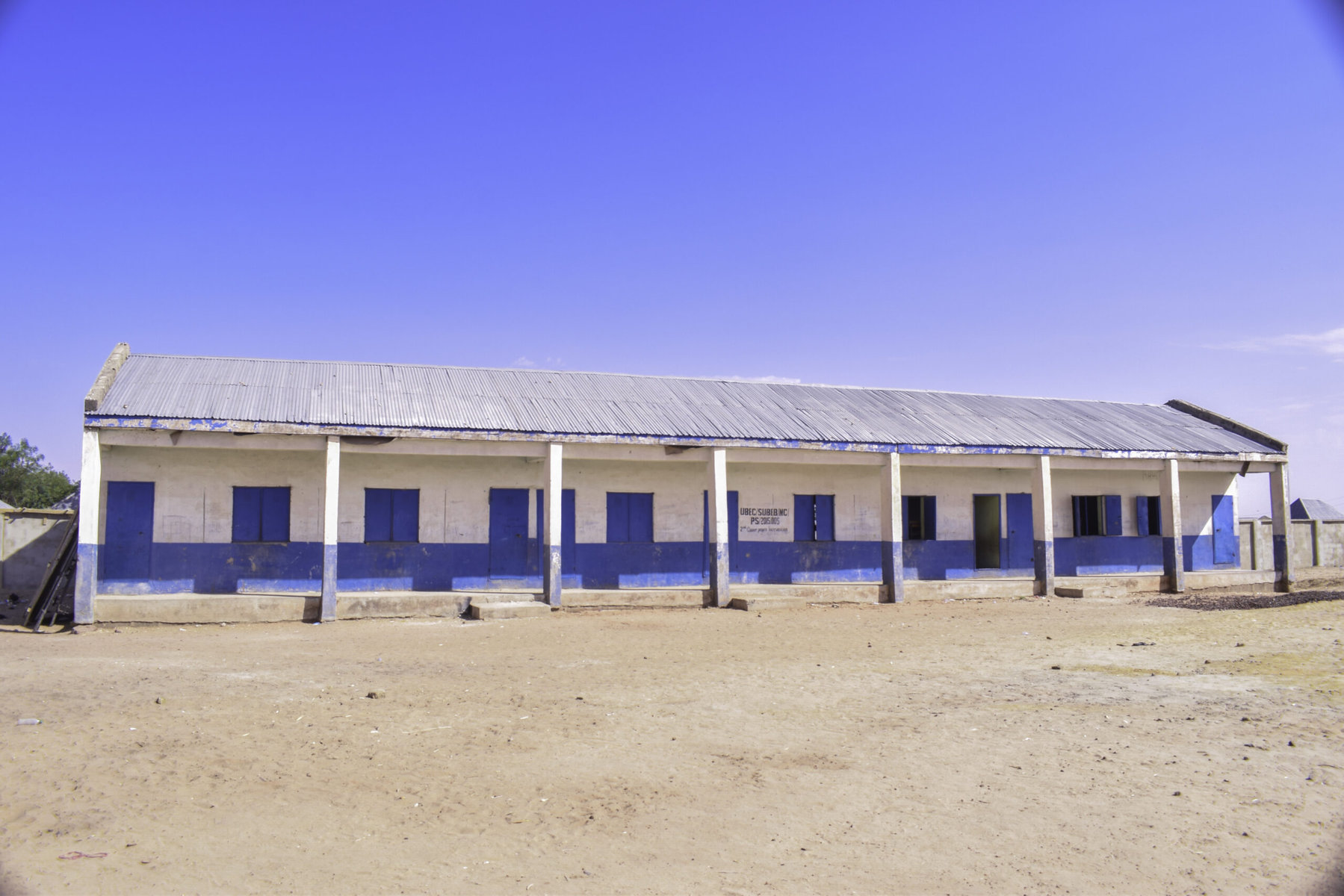 After a resident from Kurfi voiced concerns about illegal encroachment on government school land during a segment on Kukana, the land infringement stopped completely. Credit: Abdullah Tijani
After a resident from Kurfi voiced concerns about illegal encroachment on government school land during a segment on Kukana, the land infringement stopped completely. Credit: Abdullah Tijani
Over the past seven years, Kukana’s team says they’ve been instrumental in transforming the lives and addressing the grievances of more than 100,000 individuals.
“Kukana has helped a lot of people. Sometimes a community of more than a thousand people would be impacted,” he adds.
The host recalls an incident involving a resident from Kurfi, a village outside of Sokoto, who voiced concerns about illegal encroachment on government school land during a segment on Kukana. Following his appearance on the show, it seemed as though “the perpetrator was deterred, because the land infringement ceased altogether.”
“After the case, the government went there and started building a wall around the school. I was so elated when I heard this,” he exclaims.
In Nigeria, the simplicity and wide reach of radio as a mass communication tool have primed it to become a viable last resort for many victims of injustice, according to Lekan Otunfodurin, the executive director of Media Career Development Network, a nonprofit group that trains aspiring media professionals.
“Much like mass religion, radio’s appeal is far-reaching,” Otunfodurin notes regarding the success of radio shows focused on advocacy.
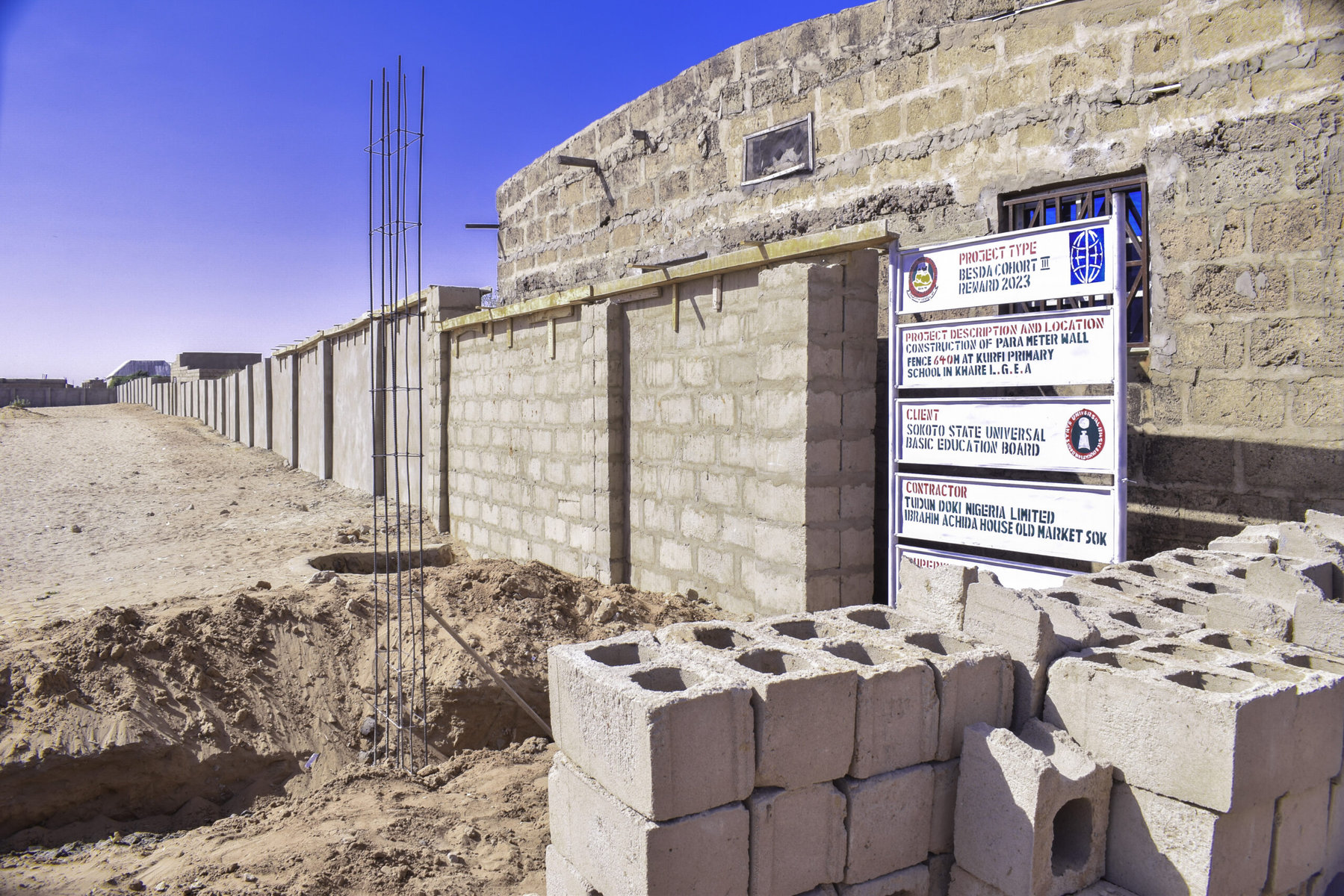 The school land in Kurfi village, Sokoto, that has been saved thanks to the radio show. Credit: Abdullah Tijani
The school land in Kurfi village, Sokoto, that has been saved thanks to the radio show. Credit: Abdullah Tijani
Like Kukana, Berekete Family is another reality radio and television program focused on civil rights. It airs on Human Rights Radio 101.1 in Abuja, Nigeria’s capital, and streams online on several social media platforms. The program, hosted by Ahmed Isah, invites people to share their problems and grievances on air while Isah tries to bridge the gap between claimants and relevant authorities.
Otunfodurin believes that despite the predominance of online media and television, radio remains important through social justice platforms such as Kukana and Berekete Family.
“The lesson here is that radio, as a form of media, is still relevant and very important in seeking justice,” Otunfodurin says. “It also costs less when compared to other forms of media.”
Despite these successes, there are times when the show’s crew feels hopeless. In many cases, the accused refuse to give their account of the story when approached by Kukana, halting any potential progress that could bring justice to the victims.


Become a sustaining member today!
Join the Reasons to be Cheerful community by supporting our nonprofit publication and giving what you can.
“There was a case of a man who came to complain that an army officer driving a car hit his mother, who died from her injuries,” Isa says. “We approached [the officer] to confirm the story and hear his side, but he declined. All efforts to get him to speak to us failed, and we couldn’t air the story.”
This type of challenge is not unique to Kukana, as noted by Otunfodunrin, who believes that all media outlets engaged in investigative journalism or advocating for justice for the oppressed encounter such issues at some juncture.
“What the host [of Kukana] can do in this situation is seek collaboration with other media platforms, especially ones with a national presence, to make the story public,” Otunfodunrin explains. “When more people are engaged, the perpetrators would be forced to grant investigators an audience.”
The article is published in collaboration with Egab.
The post Finding Justice Over the Airwaves appeared first on Reasons to be Cheerful.
Urgent need to address a surge in family violence-fuelled homelessness
A new report reveals a growing crisis of women and children fleeing domestic and family violence into homelessness prompting calls for an urgent funding package to provide pathways to safe housing. Homelessness Australia’s Homelessness and domestic and family violence: State of Response Report for International Women’s Day analyses Australian Institute of Health and Welfare data…
The post Urgent need to address a surge in family violence-fuelled homelessness appeared first on The AIM Network.
From gender-based violence to gender pay gaps, new research finds that awareness of how gender inequality impacts women and girls is still shockingly low in Australia
Plan International Australia Media Release New research by Plan International Australia, released as the world marks International Women’s Day has revealed that awareness of how gender inequality manifests in some of the most devastating ways in Australia – and in more vulnerable contexts overseas – is alarmingly low. Almost half of Australians (47%) surveyed in…
The post From gender-based violence to gender pay gaps, new research finds that awareness of how gender inequality impacts women and girls is still shockingly low in Australia appeared first on The AIM Network.
“Golden time” seasonal farming production destroyed and lost in northern Gaza amid mounting fears of worsening hunger and starvation
Oxfam Australia Media Release Gaza farmers’ two-month-long “golden time” of agricultural production has been destroyed by Israel’s military bombing and sealing of northern Gaza, ruining the enclave’s richest farmlands which are one of its biggest sources of fruit and vegetables. With Israel’s actions also severely restricting humanitarian aid, the loss of local agricultural production is…
The post “Golden time” seasonal farming production destroyed and lost in northern Gaza amid mounting fears of worsening hunger and starvation appeared first on The AIM Network.
On ‘Alternative Walking Tours,’ Formerly Homeless People Share Their Perspectives
After struggling with alcohol addiction for over 10 years — during which his 20-year banking career and 30-year marriage both collapsed — it was a presentation in a rehab center in 2019 that became the catalyst for Miles to turn his life around.
The presentation was by Invisible Cities, an organization which, since its inception in 2016, has trained 118 formerly homeless people to become tour guides. It’s a creative way of giving them not only a new income stream, but also a new sense of purpose — and skillset, too.
“This helped fill a void after I finished rehab,” says Miles, who has withheld his name for privacy reasons. “This was the opportunity that first helped me back on to a path of a ‘normal’ life again, and having a purpose.”
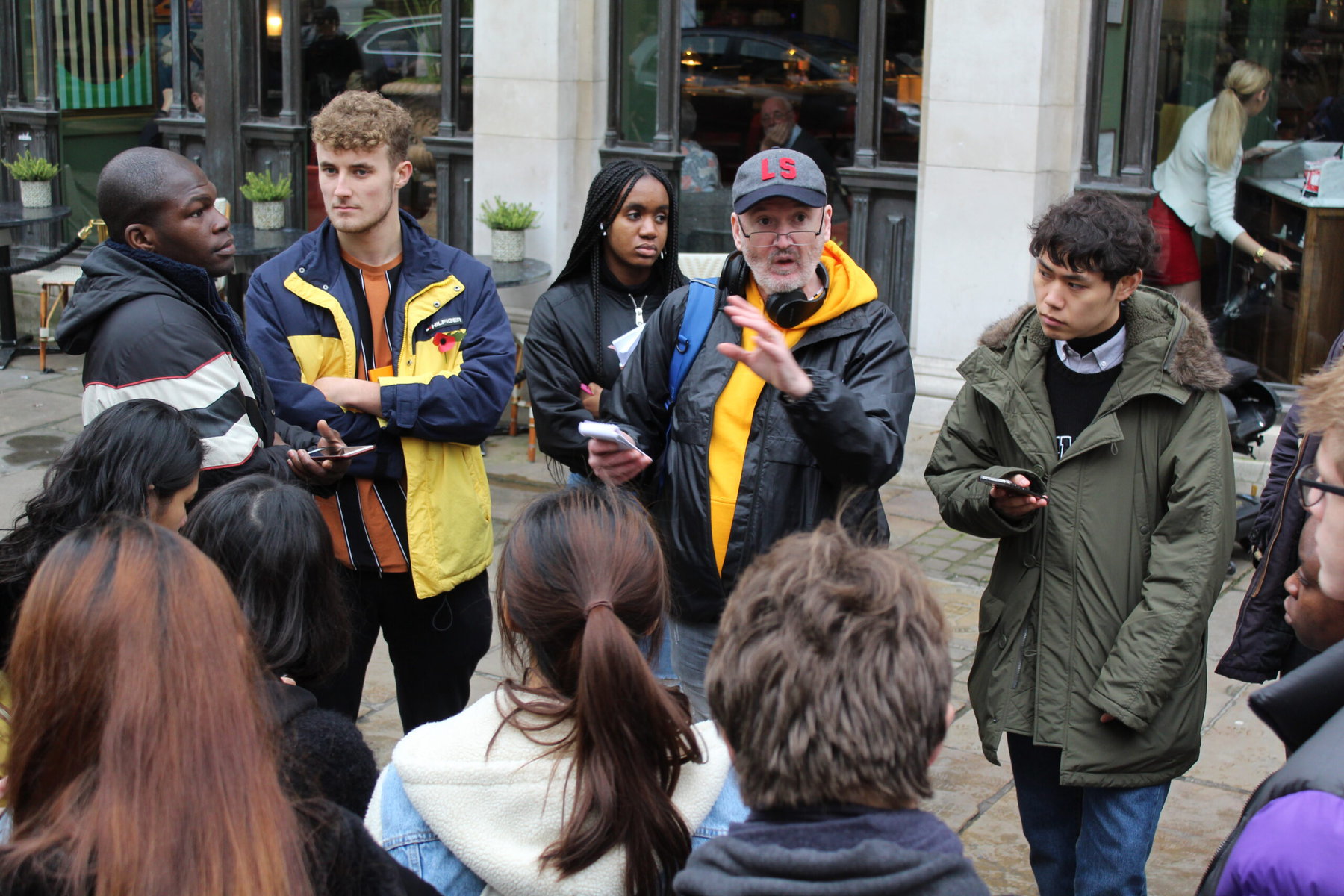 It took Miles six months to put together his tour of York. Courtesy of Invisible Cities
It took Miles six months to put together his tour of York. Courtesy of Invisible Cities
“I probably wouldn’t be where I am today without the opportunity Invisible Cities gave me. I’ll always be grateful for that.”
Invisible Cities’ guides specialize in unique topics that reflect their own personal story — such as a city’s LGBTQI history, notable women, protest culture, ties to witchcraft or how crime and punishment has evolved — in the UK cities of Edinburgh, York, Cardiff, Glasgow and Manchester.
Invisible Cities provides training for guides to create these “alternative walking tours,” as well as in public speaking and customer service skills. The organization is then responsible for marketing the tours and taking bookings. Participants pay up to £15 (around $19 US), which is split between the guide and Invisible Cities to support their efforts in recruiting more guides who have experienced homelessness.
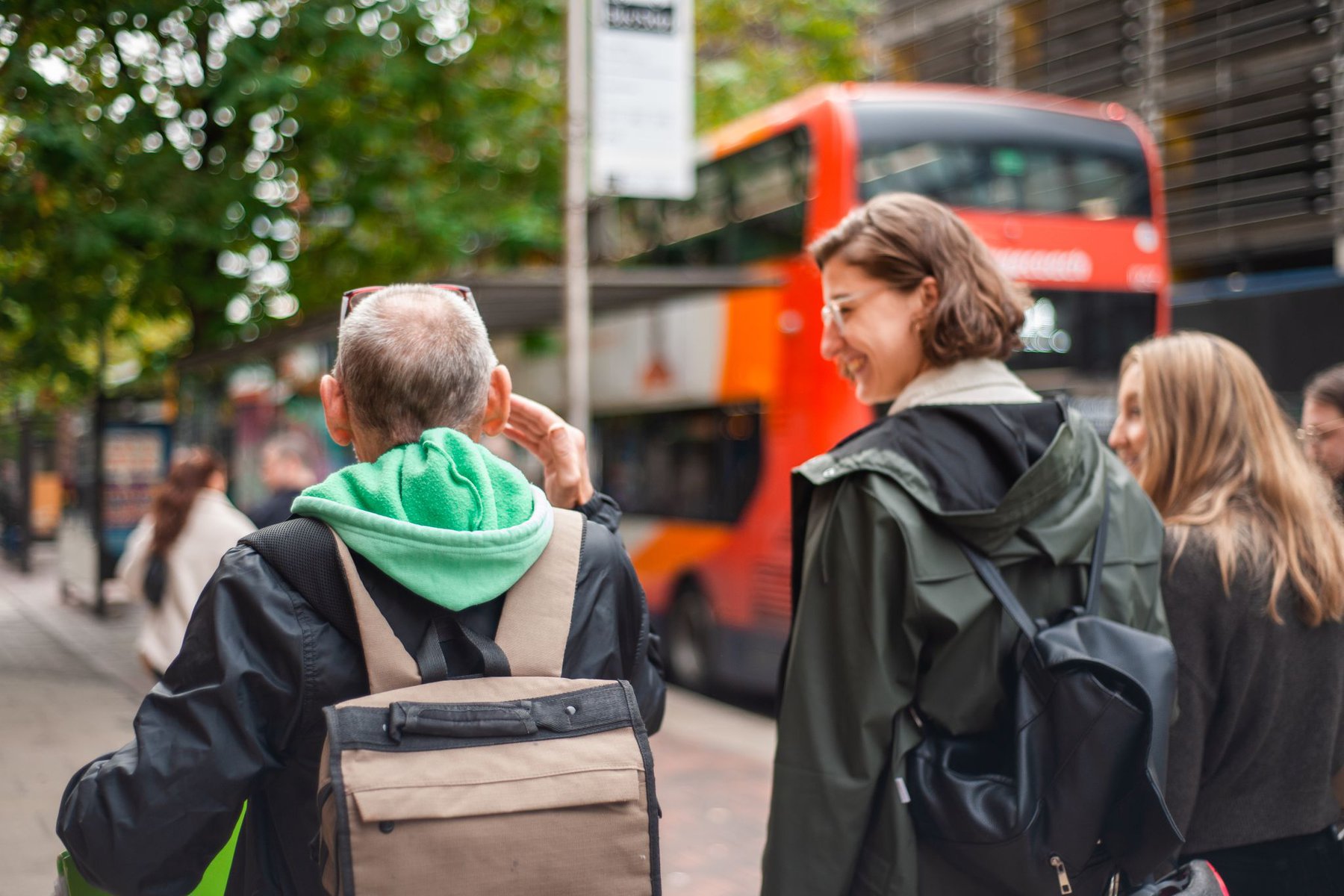 An Invisible Cities guide regales visitors on a tour in Manchester. Courtesy of Invisible Cities
An Invisible Cities guide regales visitors on a tour in Manchester. Courtesy of Invisible Cities
Invisible Cities has also set up a grant program for guides to access funding to do other external courses or start their own business, and offers training in IT and presentation skills to help them gain further employment.
With the help of sponsors, Invisible Cities also offers free community tours for specific groups. In 2023, 569 people from the Ukrainian community and from underprivileged areas attended free tours.
Miles’ tour of the English city of York, in which he has lived for the past 30 years, took him six months to put together. During that time, he transitioned out of the rehab center and into resettlement housing, where he stayed until he moved into his own apartment in 2021.
On his tours, Miles focuses on health and wealth in York, in parallel with his own experience in which his health was compromised due to addiction, and both having and losing wealth. He highlights buildings that have brought either health or wealth to the area, such as St. Leonard’s Hospital, which was one of the first hospitals in the UK, built in medieval times.
Courtesy of Invisible Cities
“This helped fill a void after I finished rehab. This was the opportunity that first helped me back on to a path of a ‘normal’ life again, and having a purpose.”
–Miles, Invisible Cities guide
He also spotlights the city’s chocolate making locations, from the Terry’s Chocolate factory, which manufactured the iconic “chocolate orange” that is a tradition to give and eat at Christmas in the UK, to the Rowntree’s site that created the popular Kit Kat chocolate bar.
“What Terry’s did is they brought employment into the city. But they recognised very early that in order to build their company, they had to provide housing for their staff, and they reinvested their original profits back into their workforce, and into building up the factory,” Miles explains.
Crushed by negative news?
Sign up for the Reasons to be Cheerful newsletter.
[contact-form-7]
“And the same with Rowntree’s, who provided health benefits and housing to their workforce. But Rowntree’s was then taken over by Nestle, a multinational conglomerate, whose profits and investment go out of the city.”
Miles’ tours have evolved over the past five years based on social developments in the city and the questions participants ask. For example, his tours have addressed issues such as gang-related drug dealing, and a lack of accessible parking in the city, and he also weaves in his own experience living with addiction.
 An Invisible Cities tour in York. Courtesy of Invisible Cities
An Invisible Cities tour in York. Courtesy of Invisible Cities
“I love being able to share the underbelly of our city, because York is very much seen as a vibrant city that’s rich with history and architecture. But I bring in aspects of rough sleeping, addiction and recovery, and I share what’s actually going on when [it’s] relevant, which keeps it alive for me, because it’s ever-changing,” he says.
Through other volunteering Miles has also built relationships with universities in the area, which have made his tour part of the curriculum for social policy students. He’s even had doctors come along who say they’ve gotten more out of it, in terms of understanding the city’s social support structure for homelessness and addiction, than a formal training day, so he is in talks with a number of local clinics to encourage more medical professionals to attend.
Founder Zakia Moulaoui Guery initially came up with the idea to help formerly homeless people gain the confidence to embrace the next chapter of their lives. To spread the concept of Invisible Cities further across the country, Moulaoui Guery has since developed a social franchise model, partnering with existing homeless organizations, which then take on the recruiting and training of guides.
This is crucial, says Moulaoui Guery, so the operation can continue to expand in a way that stays true to its mission of leveraging tourism to shine a light on issues of social justice and inequality, and help do good with the money visitors bring to iconic UK cities. Invisible Cities Cardiff, for example, is in partnership with The Wallach, the largest homelessness charity in Wales.
Courtesy of Invisible Cities
Invisible Cities guides are trained to give unique tours that weave together the city's history and their own personal story.
“Finding the right partner on the ground is always more important than whether or not that city will work in a touristic way,” says Moulaoui Guery. “I would rather work with a trusted partner, and for it to be a bit harder in terms of visitors, than to go somewhere like London, for example, which would be a lot harder to make work.”
In this way, expansion to Liverpool and the Scottish Borders is currently in the works. Moulaoui Guery is also eyeing cities like Oxford, Cambridge, Aberdeen and Dundee.
Not all who take on Invisible Cities’ training become guides — just 16 are currently actively running tours. About a quarter of a training cohort of around eight people become guides, shares Moulaoui Guery, while another quarter stay involved with Invisible Cities in a different capacity, for example, helping at tourism trade shows. Another quarter take up a different opportunity, through a job or setting up their own venture. And another quarter move on without staying in touch.
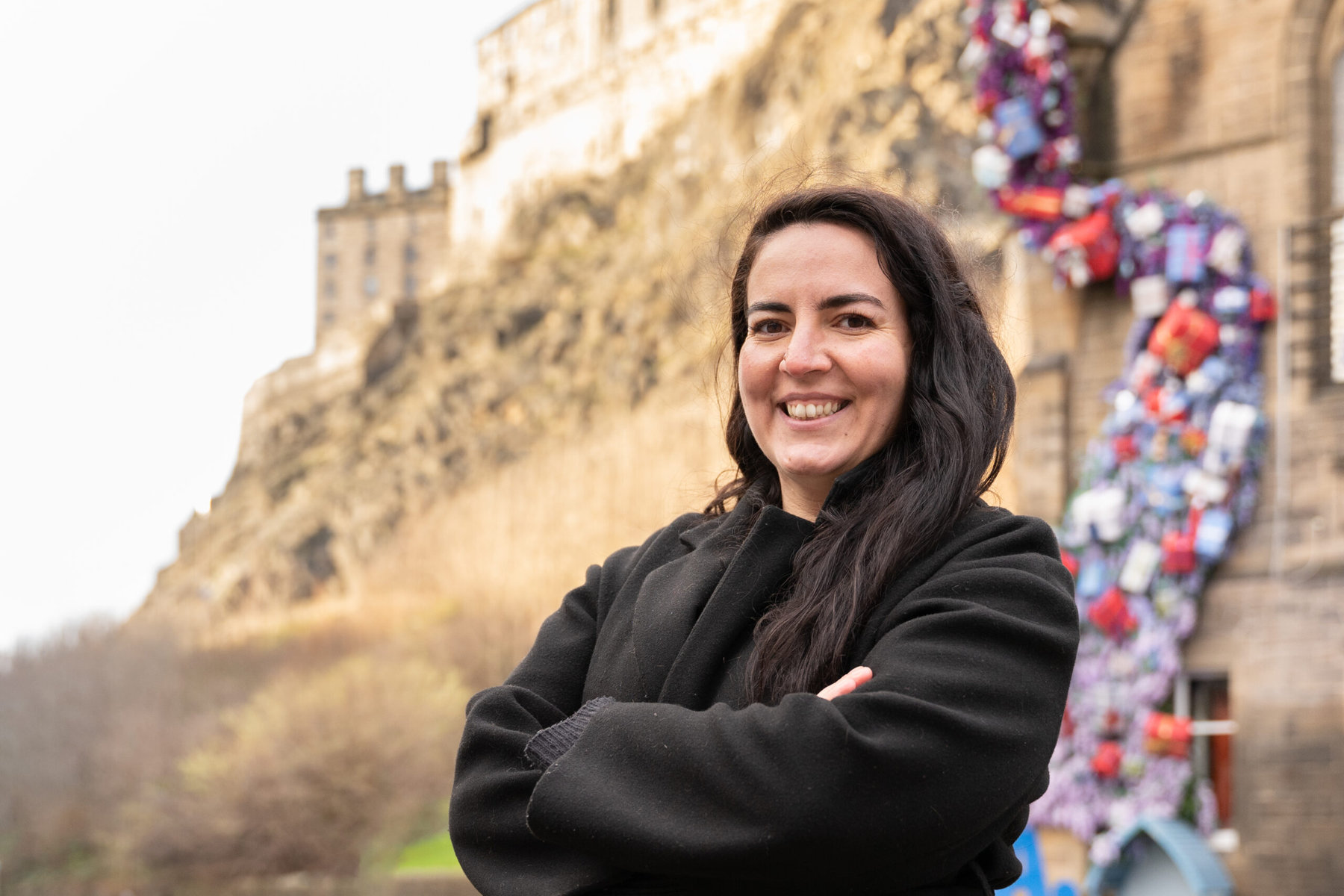 Zakia Moulaoui Guery, founder of Invisible Cities. Courtesy of Invisible Cities
Zakia Moulaoui Guery, founder of Invisible Cities. Courtesy of Invisible Cities
As much as she’s passionate about spreading the Invisible Cities movement, Moulaoui Guery is just as happy when guides move on.
“I think sometimes it’s great when we don’t hear anything from people, because it means they are moving on, and are too busy living out their dreams. What we don’t want to do is hold onto people forever,” she says.


Become a sustaining member today!
Join the Reasons to be Cheerful community by supporting our nonprofit publication and giving what you can.
Miles, meanwhile, is not only sober and in his own apartment, but has also helped set up another nonprofit organization to tackle homelessness and poverty. In light of his new commitments, he has gone from doing several Invisible Cities tours a week to a handful a month — but is keen to stay active as a guide even in this capacity.
“I don’t want to stop doing the tours,” he says. “They are really enjoyable. I will still keep this as a precious thing, because we are a close-knit team and really support each other. There’s quite a family feel.”
The post On ‘Alternative Walking Tours,’ Formerly Homeless People Share Their Perspectives appeared first on Reasons to be Cheerful.
Peak housing bodies and unions urge end to funding uncertainty
Leading homelessness advocates and unions have united in a joint push for state and federal housing ministers to plug a $73 million funding black hole that threatens to worsen the homelessness crisis by jeopardising the future of 700 critical support jobs, as ministers meet today. Homelessness services are overwhelmed by surging demand as the nation…
The post Peak housing bodies and unions urge end to funding uncertainty appeared first on The AIM Network.
Broken Windows, Warped Mirrors, and Jammed Glass Doors: On the Fascist Politics of Book Banning
In Rudine Sims Bishop’s influential essay Mirrors, Windows, and Sliding Glass Doors she addresses the importance of representation in readings; “When children cannot find themselves reflected in the books they read…they learn a powerful lesson about how they are devalued in the society of which they are a part” (1). Over the past several years [...]
Governments must act faster and listen to Productivity Commission recommendations to Close the Gap and tackle Aboriginal homelessness
The National Aboriginal and Torres Strait Islander Housing Association Media Release The Aboriginal and Torres Strait Islander homelessness crisis will continue to deteriorate should Australian governments maintain their “business-as-usual” approach to progressing the National Agreement on Closing the Gap priority reforms. The Aboriginal Housing and Homelessness Forum and the National Aboriginal and Torres Strait Islander…
The post Governments must act faster and listen to Productivity Commission recommendations to Close the Gap and tackle Aboriginal homelessness appeared first on The AIM Network.